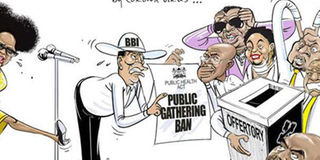Coronavirus cartoons fail to warn us how ravaging the virus can be

What you need to know:
- The smiley face of the coronavirus is seen as the third element of the political cartoon.
- The cartoons published on Wednesday and Thursday last week seem to popularise the myth that Africans do not contract the virus.
Political cartoonists have portrayed the catastrophic coronavirus pandemic as if it’s a sideshow for other seemingly more important and disruptive issues — a subordinate event. The issues have included the locust invasion, the politics of BBI and, lately, bank interest rates.
For example, Thursday’s cartoon in the Daily Nation shows Central Bank Governor Patrick Njoroge, who is dressed like a priest, standing outside a prayer booth. Hidden in the booth are borrowers. “Forgive us governor, the interest rates are too high,” they pray. And the priest responds: “I hereby extend the repayment period,” responds the Catholic father. The smiley face of the coronavirus is seen as the third element of the political cartoon.
SPECIAL MENU
Another cartoon published on Saturday has two panels. The first one shows Moses Kuria saying, “We had a special menu, then the coronavirus checked in.” The second shows Raila Odinga, trussed up like a turkey, cooking in a pot that is surrounded by Tangatanga cooks, some throwing in pinches of salt or spices.
Yet another cartoon, published on Tuesday, shows an unfazed Odinga in a BBI hat confidently holding out a Public Health Act ban on public gatherings. Looking on are frustrated Francis Atwoli and Anne Waiguru and disappointed Tangatanga team members.
A similar cartoon on Monday pictures a door to “public gatherings” that is locked with a padlock bearing the image of coronavirus. Looking on in bewilderment is a man carrying a copy of the BBI report.
A cartoon published on Monday last week, which began the series of coronavirus political cartoons, shows a “No Stopping Reggae” Raila Odinga in a room with a “Referendum” signpost, sweeping under the carpet “rubbish”, including “Lack of Funds” and “Amendment Bill.” At the door stands ‘Wanjiku’ wearing a face mask, looking on bewildered.
A cartoon that appeared on March 2 shows locusts in face masks hovering over microphones with the words “Wash hands, wear masks and avoid crowds”.
COVID-19
Similarly, all the other coronavirus cartoons either diffuse or dilute the international message of a death-dealing virus, or joke about taking the Covid-19 seriously. The cartoons published on Wednesday and Thursday last week seem to popularise the myth that Africans do not contract the virus.
A cartoon published on Wednesday this week is labelled “The last line of defence”— washing hands — while the Sunday one is about spreading rumours about coronavirus.
All in all, the series of coronavirus cartoons published one after the other in the past 10 days fail to warn readers of the devastating nature of the virus, which is the real international message of the story.
The coronavirus has provided our political cartoonists with opportunities to bring home, in graphic commentaries, the calamity of this big and devastating story the world is experiencing. It’s a story worthy of front-page treatment.
Last month when the government showed a cavalier attitude towards the deadly virus, the Nation rightly published a front-page wake-up call.
The February 28 powerful splash headline, “Virus: Why Kenya is dancing with death”, made the government change tack.
REMAIN VIGILANT
And, in no time, new Health Cabinet Secretary Mutahi Kagwe urged members of the public to remain vigilant and appreciate that the virus is not a joke. “Nobody should take lightly the threat to the nation,” he said as he confirmed coronavirus infections in Kenya.
Besides being humorous, a political cartoon on the virus should also be a teaching moment — to warn readers of the ravaging nature of the virus that causes an illness officially known as Covid-19.
Since March 9 up to March 19, the Nation has published a coronavirus political cartoon every day except for March 10 and 13.
This is a lot of cartooning, yet poor messaging, of a virus the World Health Organisation declared on January 30 a global emergency and which has spread to at least 140 countries, killing more than 7,000 people worldwide.
Send your complaints to [email protected]. Call or text 0721 989 264





